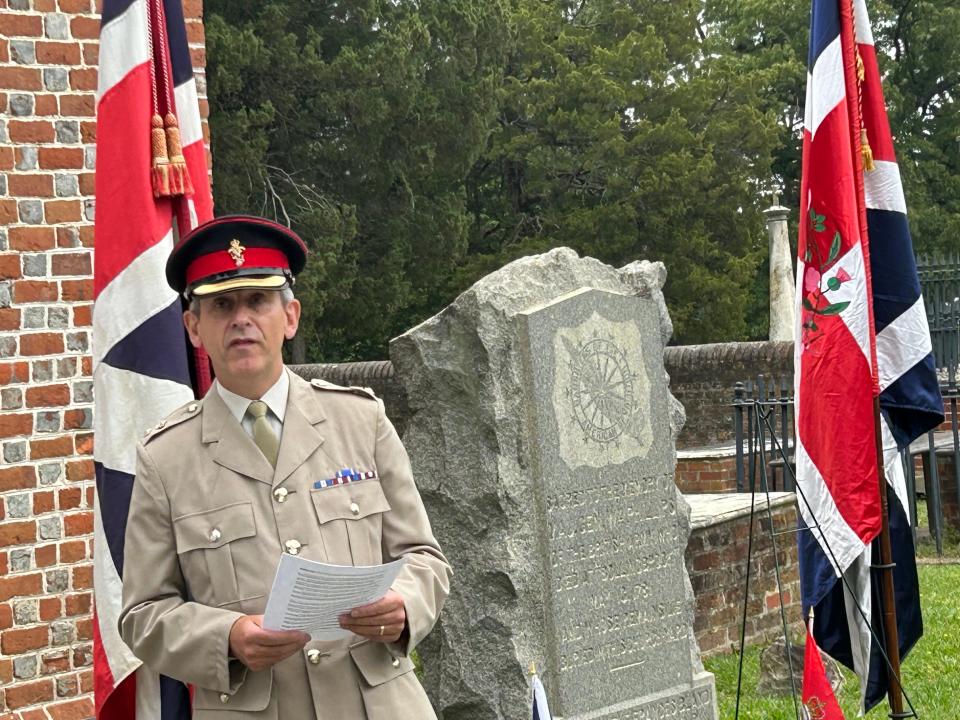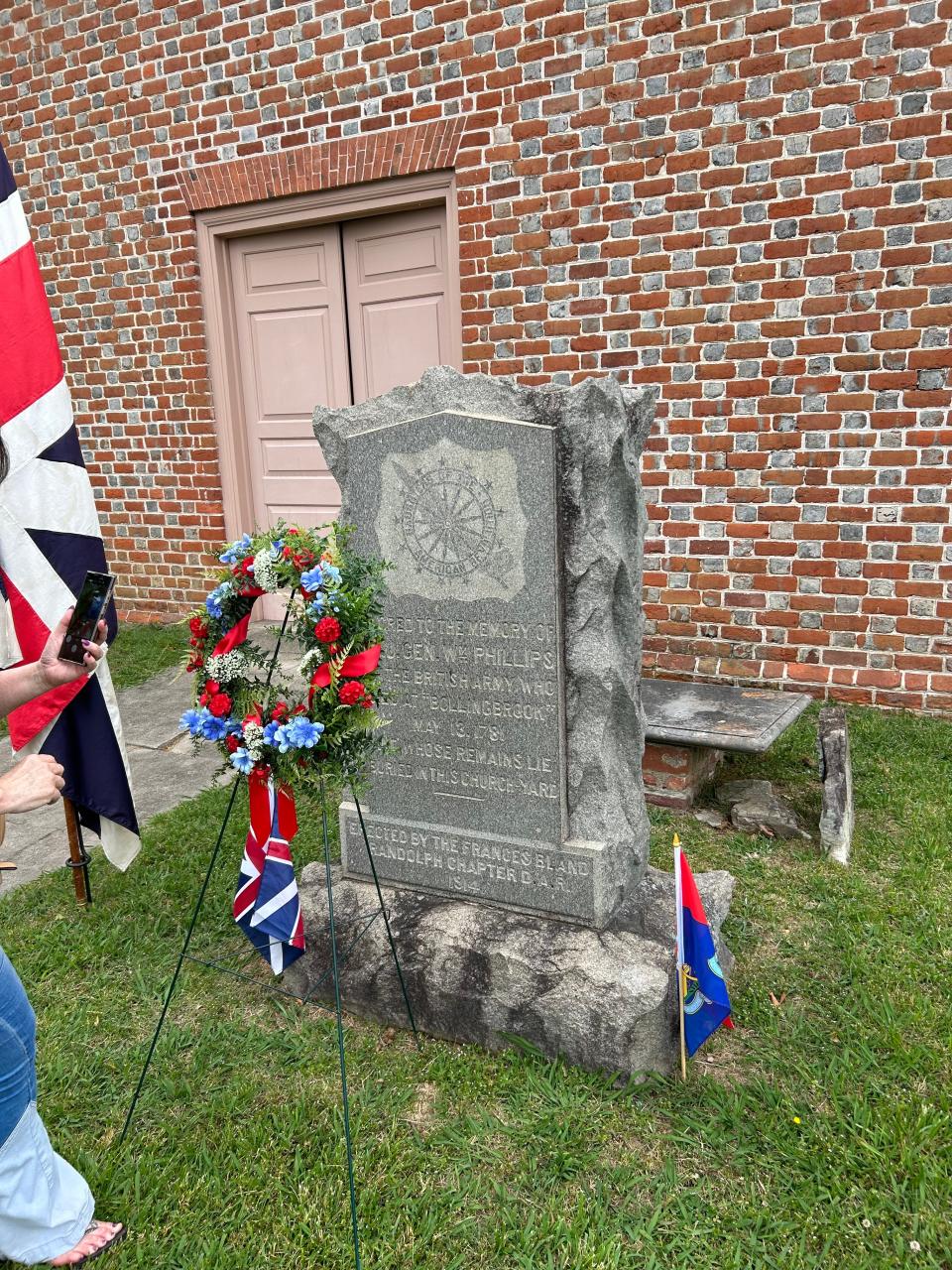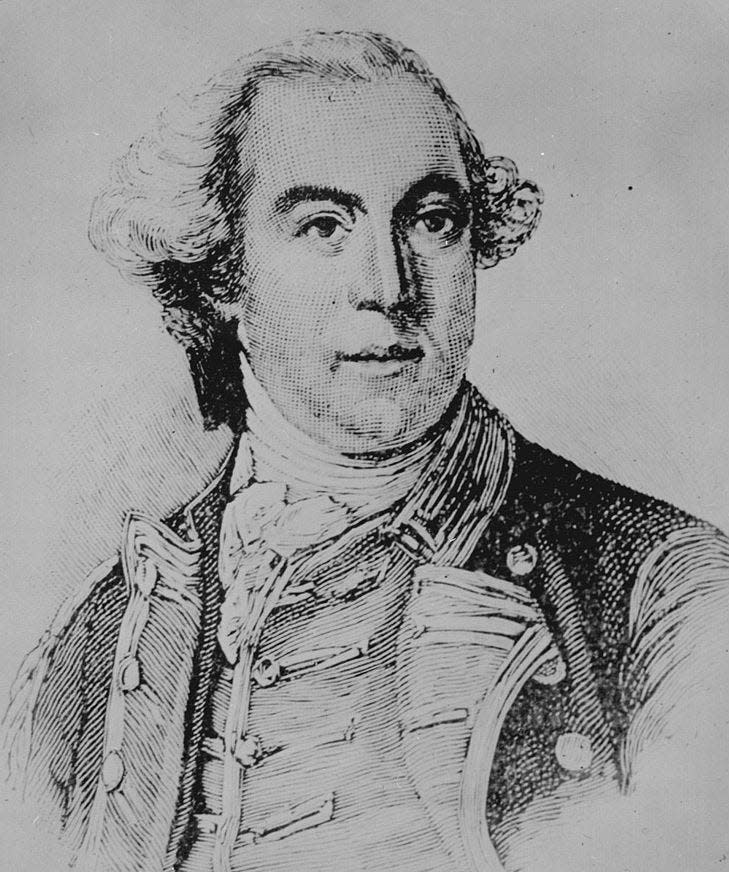'The proudest man of the proudest nation': Petersburg pays tribute to 18th-century British officer
- Oops!Something went wrong.Please try again later.
PETERSBURG – Although he was the enemy because of the color of the coat he wore during the American Revolution, Maj. Gen. William Phillips was anything but enemy-like, said the speaker at a ceremony Saturday honoring him.
Phillips “was respected and admired by subordinates and contemporaries alike,” Lt. Col. David Reith said during a brief ceremony outside Blandford Church where Phillips is buried. Even the author of the Declaration of Independence, the document that theoretically severed the colonies from Great Britain, had good things to say about him.
“Thomas Jefferson described him as ‘the proudest man of the proudest nation on Earth,’” Reith, a British liaison officer at Fort Gregg-Adams, said.
Saturday was the 242nd anniversary of Phillips’ death. Historical reenactors dressed as British redcoats led a wreath-laying ceremony at a marker memorializing Phillips that culminated a presentation on the 1781 Battle of Petersburg. That brief skirmish saw Virginia militia troops hold off the superior British forces before eventually retreating and leaving the city in British hands. However, as Reith pointed out, the British hands of Phillips were not as iron as they could have been when it came to controlling Petersburg.
“He understood the nature and character of war, but he also cared deeply about people regardless of which side of the war they were on,” Reith said. “He wanted to reduce the misery that war could inflict.”

As an example, Phillips ordered his troops to protect property owned by area colonists who were not actively engaged in military conflict.
“He spared Petersburg from the devastation of war,” Reith said.
Phillips, a former member of Parliament before the war and a former prisoner of war during the middle years of the war, came to the Virginia colony in 1781 to lead British forces from Portsmouth up the James River. On April 24, his army reached City Point and planned the next day to invade Petersburg, then a commerce hub for Virginia.
After capturing Petersburg, Phillips tried to invade Richmond but retreated after forces led by the Marquis de Lafayette arrived in time to protect Virginia’s capital. During that march back to Portsmouth, Phillips fell ill with what was believed to be malaria and died May 13 at the home of the Bolling family in Petersburg. He had been summoned to the city to meet with Lt. Gen. Lord Charles Cornwallis but because of his health, Benedict Arnold, the American traitor who now was a British officer, was ordered to Petersburg to command the troops here.
Five months after Phillips’ death, Cornwallis surrendered at Yorktown, ending the Revolutionary War.

As he lay dying, colonial forces led by the Marquis de Lafayette were shelling Petersburg from bluffs atop the Appomattox River. The area later got the name Colonial Heights after a British soldier observed “the colonials up on the heights.”
Some of the cannon fire struck the Bolling house, which reportedly prompted Phillips to acknowledge Lafayette in his final words, “Won’t that boy let me die in peace?”

He was buried later that night in an unmarked grave at Blandford Church. A slave who was killed by the shelling was said to have been buried atop him to prevent the body from being identified.
To this day, Phillips remains the highest-ranked British officer not buried in British soil. He lay in relative obscurity there until 1914 when the Daughters of the American Revolution acknowledged his presence.
Prior to the Phillips ceremony, author and historian Mike Cecere spoke inside Blandford Church to about 40 attendees about the James River campaign and its progress through Yorktown and City Point to Petersburg and eventually to Richmond.
Cecere put the lines of the Battle of Petersburg into a modern context for his audience. The first line of defense was along what is now East Bank Street, and the second line was along what is now North Madison Street.
Bill Atkinson (he/him/his) is an award-winning journalist who covers breaking news, government and politics. Reach him at batkinson@progress-index.com or on Twitter at @BAtkinson_PI.
This article originally appeared on The Progress-Index: Petersburg remembers American Revolution officer buried in city

